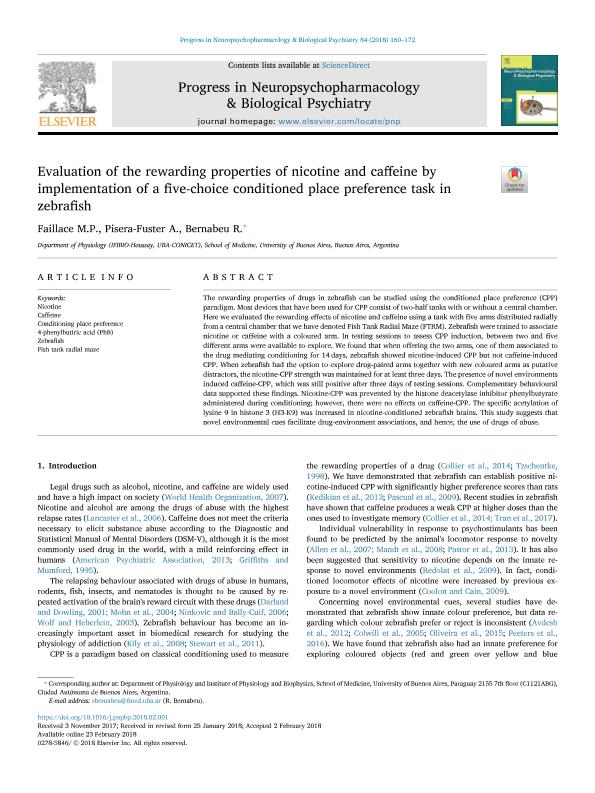Mostrar el registro sencillo del ítem
dc.contributor.author
Faillace, Maria Paula

dc.contributor.author
Pisera Fuster, Antonella

dc.contributor.author
Bernabeu, Ramon Oscar

dc.date.available
2019-10-31T20:29:17Z
dc.date.issued
2018-06
dc.identifier.citation
Faillace, Maria Paula; Pisera Fuster, Antonella; Bernabeu, Ramon Oscar; Evaluation of the rewarding properties of nicotine and caffeine by implementation of a five-choice conditioned place preference task in zebrafish; Pergamon-Elsevier Science Ltd; Progress of Neuro-psychopharmacology and Biological Psychiatry; 84; 6-2018; 160-172
dc.identifier.issn
0278-5846
dc.identifier.uri
http://hdl.handle.net/11336/87788
dc.description.abstract
The rewarding properties of drugs in zebrafish can be studied using the conditioned place preference (CPP) paradigm. Most devices that have been used for CPP consist of two-half tanks with or without a central chamber. Here we evaluated the rewarding effects of nicotine and caffeine using a tank with five arms distributed radially from a central chamber that we have denoted Fish Tank Radial Maze (FTRM). Zebrafish were trained to associate nicotine or caffeine with a coloured arm. In testing sessions to assess CPP induction, between two and five different arms were available to explore. We found that when offering the two arms, one of them associated to the drug mediating conditioning for 14 days, zebrafish showed nicotine-induced CPP but not caffeine-induced CPP. When zebrafish had the option to explore drug-paired arms together with new coloured arms as putative distractors, the nicotine-CPP strength was maintained for at least three days. The presence of novel environments induced caffeine-CPP, which was still positive after three days of testing sessions. Complementary behavioural data supported these findings. Nicotine-CPP was prevented by the histone deacetylase inhibitor phenylbutyrate administered during conditioning; however, there were no effects on caffeine-CPP. The specific acetylation of lysine 9 in histone 3 (H3-K9) was increased in nicotine-conditioned zebrafish brains. This study suggests that novel environmental cues facilitate drug-environment associations, and hence, the use of drugs of abuse.
dc.format
application/pdf
dc.language.iso
eng
dc.publisher
Pergamon-Elsevier Science Ltd

dc.rights
info:eu-repo/semantics/openAccess
dc.rights.uri
https://creativecommons.org/licenses/by-nc-sa/2.5/ar/
dc.subject
4-PHENYLBUTIRIC ACID (PHB)
dc.subject
CAFFEINE
dc.subject
CONDITIONING PLACE PREFERENCE
dc.subject
FISH TANK RADIAL MAZE
dc.subject
NICOTINE
dc.subject
ZEBRAFISH
dc.subject.classification
Otros Tópicos Biológicos

dc.subject.classification
Ciencias Biológicas

dc.subject.classification
CIENCIAS NATURALES Y EXACTAS

dc.title
Evaluation of the rewarding properties of nicotine and caffeine by implementation of a five-choice conditioned place preference task in zebrafish
dc.type
info:eu-repo/semantics/article
dc.type
info:ar-repo/semantics/artículo
dc.type
info:eu-repo/semantics/publishedVersion
dc.date.updated
2019-10-16T18:26:57Z
dc.journal.volume
84
dc.journal.pagination
160-172
dc.journal.pais
Países Bajos

dc.journal.ciudad
Amsterdam
dc.description.fil
Fil: Faillace, Maria Paula. Consejo Nacional de Investigaciones Científicas y Técnicas. Oficina de Coordinación Administrativa Houssay. Instituto de Fisiología y Biofísica Bernardo Houssay. Universidad de Buenos Aires. Facultad de Medicina. Instituto de Fisiología y Biofísica Bernardo Houssay; Argentina
dc.description.fil
Fil: Pisera Fuster, Antonella. Consejo Nacional de Investigaciones Científicas y Técnicas. Oficina de Coordinación Administrativa Houssay. Instituto de Fisiología y Biofísica Bernardo Houssay. Universidad de Buenos Aires. Facultad de Medicina. Instituto de Fisiología y Biofísica Bernardo Houssay; Argentina
dc.description.fil
Fil: Bernabeu, Ramon Oscar. Consejo Nacional de Investigaciones Científicas y Técnicas. Oficina de Coordinación Administrativa Houssay. Instituto de Fisiología y Biofísica Bernardo Houssay. Universidad de Buenos Aires. Facultad de Medicina. Instituto de Fisiología y Biofísica Bernardo Houssay; Argentina
dc.journal.title
Progress of Neuro-psychopharmacology and Biological Psychiatry

dc.relation.alternativeid
info:eu-repo/semantics/altIdentifier/doi/http://dx.doi.org/10.1016/j.pnpbp.2018.02.001
dc.relation.alternativeid
info:eu-repo/semantics/altIdentifier/url/https://www.sciencedirect.com/science/article/pii/S0278584617308709
Archivos asociados
